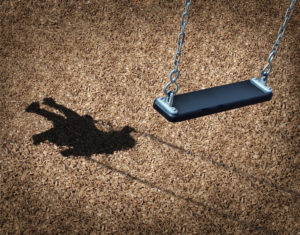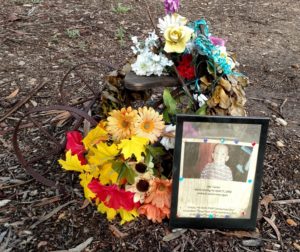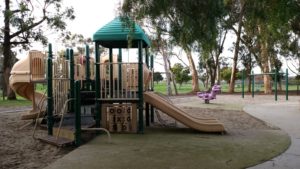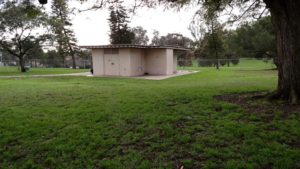
On April 25, 2002, at 2:26 in the afternoon, Tieray Jones called 911 and breathlessly reported his two-year-old stepson had simply vanished from a San Diego park when he walked to a nearby vending machine to purchase a drink for the toddler. Was this a parent’s worst nightmare or an elaborate lie to cover up a horrible crime? Prosecutors contend that at the time of this call, little Jahi Turner had already died at the hands of Tieray Jones. Fourteen years have now gone by, and Jahi’s body has never been found, despite a massive search effort.
Was Jahi Turner murdered, and if so, where is his body? Or was Jahi abducted and is still alive somewhere as the defense proposes? Why did 14 years elapse before charges were brought? These haunting and troubling questions continue to loom over this case as the preliminary hearing began for Tieray Jones on December 5, 2016, in the courtroom of Judge Charles Rogers. After a week of testimony, Judge Rogers found the prosecution had presented enough evidence for Tieray Jones, now 38, to stand trial on charges of murder and felony child abuse resulting in death. If convicted at trial, Jones could face 25 years to life.

After 14 years, the case is finally headed to trial and a memorial is left at the park where Tieray Jones said Jahi disappeared.
Background of Little Jahi Turner
Jahi Turner was born on February 10, 2000, in Frederick, Maryland to 16-year-old high school student Tameka Jones. Tameka’s mother took care of Jahi to enable Tameka to finish her high school education. Following her graduation, Tameka joined the Navy and soon married Tieray Jones, a person she had known for years. Tameka was 18 and Tieray was 22 at their December nuptials. In February of 2002, the couple moved to San Diego to commence Tameka’s naval duties. Jahi remained in Maryland with Tameka’s mother.
Two months after arriving in San Diego, Tameka received an urgent telephone call that child protective services had been called and she must immediately take Jahi or he “would go into the system.” As she did not have any money to make the trip, she received assistance from a family center and Navy friends generously took up a collection to raise the necessary funds.
On Sunday evening, April 21, 2002, Tameka arrived back in San Diego with Jahi. Early the next morning, she left for a one week deployment, leaving Jahi in the care of Tieray Jones. According to prosecutors Nicole Rooney and Bill Mitchell, that Monday, April 22, 2002, is the last day Jahi Turner is ever seen alive (by a neighbor who saw him playing by himself at the apartment complex playground). By Thursday afternoon, Jahi is reported missing. What happened to Jahi in those few short days remains unknown, yet disturbing facts were revealed during the preliminary hearing.

Tieray Jones sits between his two attorneys, Alex Ozols (on right) and Vik Monder (on left).
Tieray told Tameka Jahi Turner “had a little accident”
Tameka Jones was called as the first prosecution witness, and she testified that on Tuesday, April 23, 2002, she called Tieray from her navy ship and he told her that Jahi had “had a little accident.” He said one of their cats had jumped up on Jahi and startled him, and he bumped his head. The bump was on his forehead but he was fine explained Tieray. During the telephone call, he also confided that Jahi had wet the bed the previous night.
Tieray’s Journal Entry Documents Jahi’s Worsening Condition
Tameka testified about a journal she and Tieray kept in which they wrote to each other as a way to stay connected during their separations due to Tameka’s naval service. The journal was found by police on top of the couple’s bedroom dresser on the day Jahi Turner was reported missing.
Although Tieray told Tameka on Tuesday morning Jahi was fine after bumping his head, by nightfall Tieray’s journal entry revealed a much different story. At 7:00 p.m. on Tuesday, April 23rd, Tieray wrote: “Today for some reason he hasn’t been moving or really talking. Jahi is starting to act really funny he won’t get up off the floor. He’s not walking or talking when I tell him to get his cup he just looks at me. I know it’s going to take some time. But I don’t want him hating me for something I can’t control. The bump on his head has gone down I put ice on it. It’s gotten a little red.”
Medical Doctor Renders Expert Opinion of Inflicted Injury
Dr. Jennifer Davis, a pediatrician and child abuse specialist, reviewed the symptoms described in the journal, and testified they were consistent with blunt force abdominal trauma or a serious head injury. Either injury could be fatal if left untreated. She questioned why Tieray told differing stories about the fall, and stated a simple roll off the bed onto the carpeted floor as described by Tieray, would not have resulted in these types of symptoms. She opined that perhaps the fall was more severe or there really was no fall at all. Dr. Davis further discussed stressors prevalent in this case which can trigger child abuse, and listed neglectful parenting incidents by Tieray. In her expert opinion, either Jahi Turner had suffered an inflicted injury by Tieray, or he was guilty of medical neglect for failing to seek medical care.
Jahi’s potty training accidents, lack of money, lack of food, and lack of cigarettes were all stressors which could have triggered abuse in this case testified Dr. Davis. Tieray’s desperation for money was documented by his journal entries, his own actions, and witness testimony. Tieray tried to obtain money from one bank, but the bank would not let him use Tameka’s bank card without her authorization. Resorting to extreme measures, he called the bank and pretended to be a woman, and even had his ex-girlfriend call the bank and pretend to be Tameka. He called friends daily asking to borrow money, and the money was not just for life necessities. Tieray revealed in the journal and in a police interview that he told his friend Greg he needed money to purchase diapers, but he really intended to buy cigarettes. Dr. Davis noted Tieray’s growing frustration, as on Wednesday, the day before he reported Jahi missing, he wrote in the journal, “This couldn’t be a more fucked up day.”
On cross-examination, defense attorney Alex Ozols pressed Dr. Davis to disclose this was the first time she had ever made an abuse claim without a body or any medical or autopsy report. Neither had she seen any prior abuse by Tieray, or read anything that he had abused his other children.
Neighbors Saw Tieray Carrying Out Bags of Trash Before Jahi Turner Is Reported Missing
Neighbors of Tameka and Tieray at the naval housing complex testified they saw Tieray taking out trash bags on Wednesday, April 24, 2002, the day before Tieray reported Jahi missing.
Jennifer Newton testified she saw Tieray carrying out white trash bags, and one big bag did not look like trash. She never saw Jahi Turner.
Katey Higgins testified she saw Tieray taking out two black trash bags, which were full and looked like laundry. He headed to a trash bin that was further away than the one closest to their apartment building. When Tieray looked up at her in the window, they made eye contact, and he appeared a little nervous. Later she saw him take out another trash bag which was one-fourth full and looked like regular trash. She never saw a boy with him.
Tieray’s Inconsistent Stories to Police & His Emergency Phone Calls
A massive police effort immediately ensued upon Tieray’s report of Jahi vanishing. At the park, Tieray talked with police detectives and subsequently gave four videotaped interviews (two on the day he reported Jahi missing, one the next morning, and one the following week). Detectives noted Tieray’s departure time for the park varied from interview to interview. He stated times of 8:45 a.m., 10:00 a.m. and 1:00 p.m. Tieray also stated he received a phone call at his apartment from his ex-girlfriend right before leaving for the park. Telephone records reveal the call came in at 1:58 p.m., making his departure to the park even later than 1:00 p.m. At the park, records reveal Tieray called another ex-girlfriend at 2:20 p.m. before calling 911 at 2:57 p.m.
Tieray further said he was napping prior to going to the park, yet four prosecution witnesses saw him walking from the Food Bowl Market around noontime. One neighbor saw him walking from the market by himself around 12:15. When confronted with a bank transaction from that very market, Tieray finally admitted he had gone to the store.
To further show Tieray was not really napping, the prosecution presented Tieray’s telephone records of Thursday, April 25, 2002. From 11:30 a.m. until 12:03 noon, Tieray made five phone calls trying to reach Tameka, leaving messages, “It is an emergency.” In one videotaped interview, as questions became more forceful as to what matter was so urgent, Tieray refused to disclose the reason and terminated the interview soon thereafter.
Witnesses Did Not See Jahi Turner at the Park
The prosecution called a string of witnesses who were at the park with their children on April 25, 2002, and they all testified they did not see Jahi Turner or Tieray at the playground. One witness did recall seeing Tieray speaking to police, but never saw Jahi.

The Golden Hill park on 28th and Cedar where Tieray Jones said Jahi disappeared 14 years ago. This is what the park looks like today.

A vending machine was next to this bathroom where Tieray Jones said he tried to purchase a drink for Jahi. The vending machine is no longer there as shown in this current photo.

Looking towards the park from the bathroom/vending machine area. Tieray Jones said he walked to the vending machine and back to the park where he discovered Jahi missing. This is a current photo.
Police Find Jahi’s Clothes in Dumpster and Discover Blood
While police continued to search the park and neighborhoods, other detectives returned with Tieray to his apartment. During the search of the complex, soiled bedding and clothes belonging to Jahi were discovered discarded in a dumpster. Dorie Savige, a Forensic Crime Scene Specialist described the clothes as child’s overalls, a Winnie-the-Pooh shirt, toddler jacket, and jeans. Tieray explained in one interview that there had been a box of clothes for the Goodwill in the apartment, and he got tired of looking at it, so he threw it out. On cross-examination, the defense brought out the Winnie-the-Pooh shirt was infant size 3, much too small for Jahi. However, the yellow jacket and jeans currently fit Jahi, and were still discarded. They also had urine on them, as did the sheets from the master bedroom. Did Jahi wet the bed more than once? Or did Tieray simply throw the clothes away instead of laundering them as he said? Jahi’s pajamas were also discovered in the trunk of Tieray’s car.
Jahi’s Elmo blanket and a onesie tested positive for Jahi’s blood. To the defense the presence of this blood could be easily explained as Tameka testified Jahi had nosebleeds. Tieray’s blood was found on the carpet by the master bed and on washcloths in the refrigerator. The defense brought out it is not uncommon for someone to bleed in their own home.
Dorie Savige finished her testimony by saying she would never forget Tieray because when she processed him, he was very friendly and talkative, not sad or concerned, and even offered to share his fried chicken recipe with her.
Massive Search of Landfill But the Body of Jahi Turner Not Found
Beginning on April 30, 2002, a week-long search of the Miramar landfill took place. Military personnel in the astonishing number of 378 strong searched 24 hours a day, shifting through 5,000 tons (10 million pounds) of trash. Despite this exhaustive search, Jahi’s body was not found.
The defense later argued the police could have searched another landfill but chose not to because if their search again came up empty, they would have to consider the possibility Jahi Turner was really abducted, and thus their sole focus on Tieray was unwarranted.
Tieray’s Ominous Statement to Tameka and The Taped Telephone Call
Detective Louis Maggi testified Tameka told him one time when she was fighting with Tieray he said, “If you don’t talk to me than you will never know the truth.” Later Tieray said the statement was about other women, yet Tameka believed it was really about Jahi. On cross-examination, the defense brought out there was conflict between Tameka and Tieray as they were going through a divorce and custody battle (for a child born later). The couple separated in 2004.
Testimony revealed Tameka had a strained relationship with law enforcement, and her cooperation did not commence until a triggering incident in 2013. Tieray called Tameka and was very upset, telling her he had heard police had found Jahi in a bag, deceased.
On March 17, 2015, Tameka made a “controlled call” to Tieray, which was scripted and recorded by law enforcement. At the beginning of the telephone call Tameka tells Tieray she had received a call from a San Diego detective stating that Tieray doesn’t believe Jahi is alive. Following this revelation, a long pause ensued before Tieray answered, saying, “I guess the time, presume would know something.” Tameka begins to cry as she tells him “Can you tell me exactly what happened that day? I need to hear it from you. Everything. I want to know everything.” In the almost 23-minute call, Tieray recites the park story, tells Tameka he loves her, says he already feels the blame, and knows she had to deal with the fact that she might be married to a man who hurt her child. He says, “An accident is supposed to be an accident. Anything else would have to be my fault.” He goes on to explain that if it was an accident, he would have said it was an accident as he has never run from anything in his life.
Defense Case
Although the preliminary hearing is not a full trial and the defense need not put on their full case, defense attorneys called three witnesses. Jamie Brown, who was eight years-old in 2002, testified she was at the Golden Hill recreational facility on April 25, 2002, and saw a white woman walking with three children. One child was screaming and she heard him say, “You’re not my mommy. Leave me alone. I want to wait for my dad.” This woman entered a home and two minutes later, left with two children. On cross-examination, the prosecution brought out her description of the child’s clothes changed three times, and in her initial interview she never told the police the child pulled away or said anything.
Judith Ann Farsaci was called next. She is a grandmother who was on a bus in the late afternoon of April 25, 2002, and saw an African American or Hispanic woman who either looked like a man or it was a man who was disguised as a woman with a young child. She had an uneasy feeling there was something wrong. Farsaci could not stop talking, and even though her testimony had concluded, as she left the witness stand, she blurted out she thought she saw Jahi at the grocery store as well.
The defense’s last witness was Pierre Braun, a volunteer for San Diego Search and Rescue, and the owner of a trained scent dog. On the day Jahi was reported missing, Braun and his dog searched the playground and surrounding neighborhoods. The dog went to a house near the home Jamie Brown testified she saw the woman enter with the three children, and the dog performed a cadaver alert. On cross-examination, the prosecution brought out a death had occurred at the house, and two dogs had lived at that address, one of which had been bleeding. As the dog did not find any scent of Jahi at the playground or nearby fencing, the prosecution argued this was further proof Jahi had never been at the playground.
Judge Rogers also allowed the defense to bring in the testimony of a witness, an elderly man who has since passed away, who thought he saw Jahi in Imperial Beach and was “sold to Orientals.”
Motion to Dismiss the Case
Defense attorneys Alex Ozols and Vic Monder filed a Motion to Dismiss the case based on a violation of due process due to prosecutorial delay. The defense argued the prosecution had the same evidence 14 years ago, but chose not to file charges, and now the passage of time has damaged Tieray’s ability to present his case, as witnesses have died, memories have faded, and the physical evidence is now dated. The prosecution countered they have new evidence, which includes the cooperation of Tameka, the controlled phone call, and further scientific testing, including forensic serology. A ruling on this motion will be made at the time of trial.
Case Set for Trial But Will Jahi Turner Ever Be Found?
Trial is now set for April 3, 2017. At trial, will the haunting questions finally be answered? Yet the most haunting question remains: Will Jahi Turner ever be found?
To See Photos of Little Jahi and To Read About Tieray Jones’ Arrest, Please Go To:
https://www.kpbs.org/news/2016/apr/18/suspect-arrested-for-2-year-old-who-disappeared/
To Read More of Aleida’s True Crime Stories From Inside the Courtroom, Please Go To:
About Aleida K. Wahn, Esq.


I am an attorney, award-winning true crime writer, and legal analyst of criminal cases. I cover criminal trials and write stories and books about compelling, gripping, and unforgettable cases that impact our world. I take you into the courtroom in high-profile murder trials, rape cases, crimes of passion, cases involving mental illness, deviant behavior, and more. I have a deep passion for true crime, criminal law, and all aspects of the criminal justice system. I have appeared as an expert on true crime shows, including “48 Hours,” “Snapped,” and “The Dead Files,” and provided legal analysis on high-profile criminal trials on Court TV, the Law & Crime Trial Network, Fox 5 News, ABC 10 News, and KUSI News. I also create and host shows with the Del Mar Television Producers Group, addressing criminal justice and social issues in recent criminal trials.
I provided my insight and legal analysis on Court TV and the Law & Crime Trial Network of the high-profile trial of former NFL star Kellen Winslow Jr. It was a trial that captured the nation as the heralded ex-football star with fame, fortune, and a famous name stood accused of multiple rapes and other sex crimes involving five women. As the trial delved into shocking facts, complicated legal issues, and unexpected twists and turns, I was there for every minute. After the trial, I wrote a book on the case, going behind the headlines to share the extraordinary details of what happened inside the courtroom. Judging Winslow Jr.: From NFL Star to Serial Rapist? Inside the Shocking Rape Trial of Kellen Boswell Winslow II is now available on Amazon.
I am passionate about telling true crime stories, as these penetrating stories have the power to move us all, while highlighting societal issues which need to be addressed. I have personally seen the human devastation which is present in each trial and believe there is a lesson to be learned in every single case. It is through awareness and examining critical issues society can effect change and even make new laws. To learn more, please visit: https://www.aleidalaw.com.
Read about the gripping and unforgettable trials that I have covered in my latest books:



